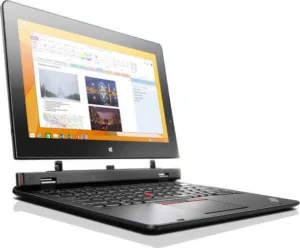Financial analyst and investment advisor Richard Windsor publishes a daily newsletter for his clients called Radio Free Mobile (www.radiofreemobile.com), which covers the mobile technology industry. In the June 6th number, he noted that the stands featuring PCs at this year’s Computex attracted very little interest, and that most commentators took this as additional evidence that the PC industry is in terminal decline. But, said Richard, “I think a lot of this is self-inflicted.”

![]() Richard continued more or less as follows (I have edited moderately). The content is used with the author’s permission.
Richard continued more or less as follows (I have edited moderately). The content is used with the author’s permission.
I have long argued (in vain so far) that if the PC industry would address the 2 in 1 segment properly, it could trigger a product cycle that would kick the PC market back to growth at least for a few years.
This opportunity is rooted in my belief that the laptop form factor is obsolete and can be replaced with something that offers a more productive and ergonomic experience. There is no longer any reason for the keyboard to be physically attached to the screen, but the industry is so used to this form factor that seems incapable of moving on.
With the keyboard separate from the screen and a portable mouse, a tablet PC has the capability to become a portable desktop giving the user a desktop quality experience wherever he is. The average computer buyer these days is a content creator as most of the emailing /web-browsing crowd have long since migrated to smartphones and tablets. This means that a keyboard, mouse, and probably Office are important to that user, which I think creates an opportunity for the PC industry to offer something better than a laptop.
A good example of how badly the PC industry misunderstands this issue is the specification of most laptops where the screen can be detached. In almost every single product (Surface Book included) the keyboard stops working the minute the screen is detached. This makes no sense whatsoever as it obviates the one use case (portable desktop) that the product really excels at. This is a very simple and cheap problem to correct and the fact that no one has done it clearly points to how short-sighted the industry has become.
The biggest problem with this proposition is marketing. Users have been using laptops for 40 years and they find it almost impossible to contemplate a better solution. Consequently, vendors need to educate users that there is something better on offer and on how it would benefit them. Unfortunately, much of the PC industry hasn’t realised there is an opportunity, and even Intel and Microsoft are struggling to send a clear message.
If they can get it right, then there is a big product cycle to be had as laptops are replaced with tablet PCs, which would push the industry back to growth, albeit only for a few years. In the absence of this cycle, the PC market is likely to continue drifting downwards until all the content consumers have left the platform. At that point it should stabilise.
I don’t think the PC is dead as iOS and Android are awful platforms for content creation, but the PC industry has to start moving with the times.
Needless to say – but that won’t stop me from saying it – a resurgence in the portable PC business would also be good for display-makers. – Ken Werner.

